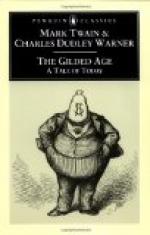“Nothing like this, sir, nothing like this,” protested the witness.
“That’s all, sir,” said Mr. Braham severely.
“One word,” said the District Attorney. “Had you the least suspicion of the prisoner’s intention, up to the moment of the shooting?”
“Not the least,” answered Harry earnestly.
“Of course not, of course-not,” nodded Mr. Braham to the jury.
The prosecution then put upon the stand the other witnesses of the shooting at the hotel, and the clerk and the attending physicians. The fact of the homicide was clearly established. Nothing new was elicited, except from the clerk, in reply to a question by Mr. Braham, the fact that when the prisoner enquired for Col. Selby she appeared excited and there was a wild look in her eyes.
The dying deposition of Col. Selby was then produced. It set forth Laura’s threats, but there was a significant addition to it, which the newspaper report did not have. It seemed that after the deposition was taken as reported, the Colonel was told for the first time by his physicians that his wounds were mortal. He appeared to be in great mental agony and fear; and said he had not finished his deposition. He added, with great difficulty and long pauses these words. “I—have —not—told—all. I must tell—put—it—down—I—wronged—her. Years —ago—I—can’t see—O—God—I—deserved——” That was all. He fainted and did not revive again.
The Washington railway conductor testified that the prisoner had asked him if a gentleman and his family went out on the evening train, describing the persons he had since learned were Col. Selby and family.
Susan Cullum, colored servant at Senator Dilworthy’s, was sworn. Knew Col. Selby. Had seen him come to the house often, and be alone in the parlor with Miss Hawkins. He came the day but one before he was shot. She let him in. He appeared flustered like. She heard talking in the parlor, I peared like it was quarrelin’. Was afeared sumfin’ was wrong: Just put her ear to—the—keyhole of the back parlor-door. Heard a man’s voice, “I—can’t—I can’t, Good God,” quite beggin’ like. Heard—young Miss’ voice, “Take your choice, then. If you ’bandon me, you knows what to ’spect.” Then he rushes outen the house, I goes in—and I says, “Missis did you ring?” She was a standin’ like a tiger, her eyes flashin’. I come right out.
This was the substance of Susan’s testimony, which was not shaken in the least by severe cross-examination. In reply to Mr. Braham’s question, if the prisoner did not look insane, Susan said, “Lord; no, sir, just mad as a hawnet.”
Washington Hawkins was sworn. The pistol, identified by the officer as the one used in the homicide, was produced Washington admitted that it was his. She had asked him for it one morning, saying she thought she had heard burglars the night before. Admitted that he never had heard burglars in the house. Had anything unusual happened just before that.




